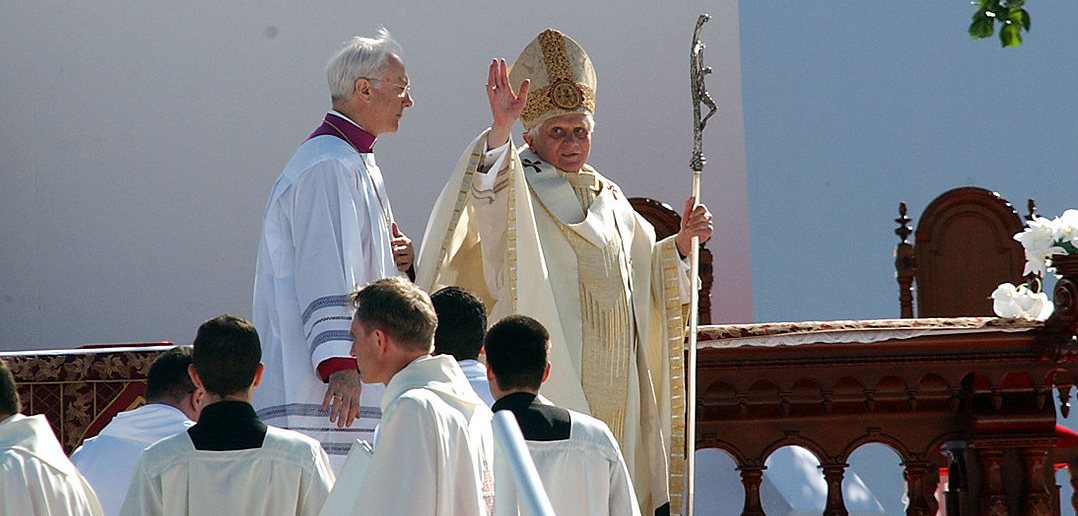Pope Benedict’s new book-length interview with Peter Seewald, entitled Benedict XVI — Last Testament, has offered new insights into the mind of the Pope Emeritus. From Ed Pentin at the National Catholic Register, we are treated to portions of both Benedict’s own commentary and that of his long-time personal secretary, Archbishop Georg Gaenswein, who spoke at an event for the book on September 12 (emphasis added):
Archbishop Gaenswein, who is also prefect of the Pontifical Household, drew particular attention to two key passages relating to Benedict’s resignation which he described as especially “illuminating” and “new knowledge.”
The book, as Archbishop Gaenswein pointed out, tackles three key areas: “the roots of the reasons and motives” and the “exact circumstances of Benedict’s puzzling resignation”; his relationship with Pope Francis; and the German Pope’s “personal point of view” on the different “crises and ‘scandals’ of his papacy.”
Regarding his resignation, Gaenswein states that the Pope Emeritus reiterates that “it was not an escape” and insists that “nobody” was demanding his resignation. “It was clear to me that I had to do it and that this was the right moment,” Benedict says in the book. “It was a complete surprise for everyone.”
Benedict says he “knew: I can’t do it anymore” and saw that the time had come to “disengage from the large crowds of people and adjourn into this greater intimacy.” It was “not an inner flight from the demand of the faith, which leads the people to the cross,” he explains in the book. “The step is not a flight but another way to remain faithful to my ministry.”
Asked if he ever regretted resigning, he replies: “No. No, no. I see that it was right every day” and that everything went even better than he had planned. For this reason, he said he couldn’t see himself as a failure. As to theories that some wanted him out and manoeuvred him to resign, the Pope emeritus replies curtly, “total nonsense!”.
At the book launch, Archbishop Gaenswein said that what the Pope said next should be “taken to heart as new knowledge” about how he sees his resignation and his role as Pope emeritus. “The Pope is not super human,” Benedict says in the book. “If he resigns, he keeps the responsibilities in an inner sense but not the role. In this respect, the papacy lost nothing from its size, even if the humanity of the office emerges perhaps more clearly.”
Stressing that he is “in contact daily” with Benedict XVI, Archbishop Gaenswein said he could only stress such comments to be “authentic.” He added that another passage about this same topic was also “somehow new and distinctive and especially illuminating.”
He referred to when Benedict recounts his desertion as a conscripted member of the Nazi Youth in 1945 at the age of 17, and Benedict’s admitted astonishment that he just “decided to go home” despite the risk of being shot.
Archbishop Gaenswein said when he read that, it felt like a “déjà vu” experience, a “hidden key” that helped explain his resignation. “He was so certain of this, like a sleepwalker against 1,000 aggressors, and in the summer of 2012, a second time, and calmly ‘decided to go home.’”
Moving on to Pope Francis, the German prelate stressed in his presentation that Benedict had “absolutely not” expected Jorge Mario Bergoglio to become Pope, but was very glad he [Francis – ed.] “spoke on one side with God and on the other side with the people.”
Furthermore, Archbishop Gaenswein said Benedict speaks about seeing “no breach anywhere” between him and Francis — “new accents, yes, but no contradictions”, a man of “practical reform”. Benedict also sees Francis as correcting his own Petrine ministry by being someone “who is used to always being with people.” Perhaps, Benedict confesses, “I was actually not with the people enough.”
Here, once again, we are treated to an understanding of how Benedict views his own abdication and the pontificate of Pope Francis. Far from the words of a man who was coerced or in captivity, as some have speculated, we are given every reason to believe that there is no contention in Rome over who holds the Petrine office.
The Seewald interview is alleged to be Pope Emeritus Benedict’s last planned published work.


